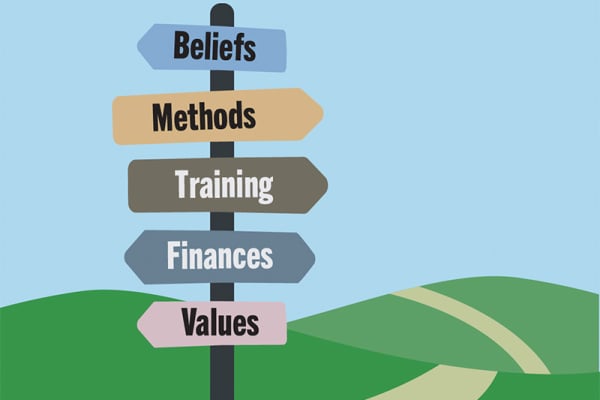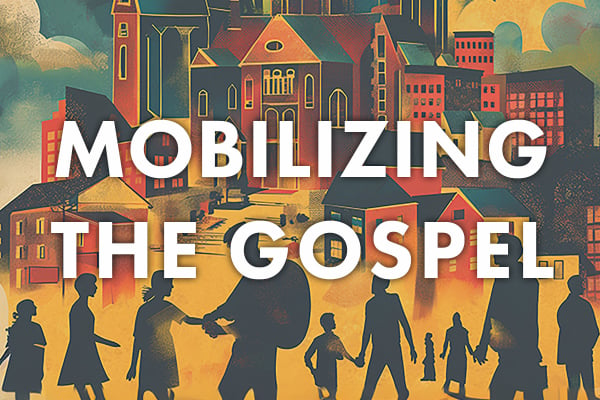
Preparing Couples for Cultural Stress, Part 1: Understanding Stressors
By Sue Eenigenburg
In this three-part series, adapted from an article first published in 2008 in EMQ magazine, we tackle what global workers can do to prepare their marriages for the culture stress they know will come. In this first resource, we look at some of the stressors. In the second, we explore some strategic things husbands and wives should know and do as they prepare for the field. The third lists twenty-five questions and ideas for couples to discuss before leaving for their first term of service.
Culture stress can make or break a marriage. My husband and I had a solid foundation for our relationship and went to minister overseas after eight good years of marriage and three children. I would never have imagined that I would find myself daydreaming about leaving him. With a new baby, the language and cultural differences, the stress of dealing with ministry in and out of our home, keeping up with laundry, and cooking and cleaning for our family of six, I was ready for a trip to Hawaii—without him and the kids. I felt tempted to charge my trip to his account (forgetting that we had the same account!) and let him take care of the bill, the kids and the laundry. I wasn’t sure if I even wanted to come back.
Even the most stable marriages are severely strained in the context of cross-cultural living. Leaving the comfort of one’s home and built-in support system opens a marriage relationship to new levels of stress. It is not that the marriage is necessarily failing before moving overseas.
However, without the usual support systems (which may go unnoticed in the couples’ home country), normal stressors can cause greater damage. Issues do not change when cultures do. Therefore, couples need to be aware of the marital issues they face in their own culture and begin to address those before moving overseas.
In addition to the typical stressors, global workers also encounter unusual ones. In The Family in Mission, Leslie Andrews lists some of the distinctive stressors cross-cultural workers face:
Among these are such things as cross-cultural living and communication in a second language; social and geographical isolation; political unrest; communication and conflict with co-workers, friends and family; work obligations and roles; and limitations of time and resources. (2004, 265)
Not only do cross-cultural workers face unique stressors, but they must also deal with them in an alien environment. In fact, it may be hard for them to distinguish between culture stress and normal stressors they simply must deal with overseas. For example, say someone breaks into your home while you are on the mission field. Although this can happen to a couple in their home country, when it happens in an unfamiliar country they must deal with it in a different language, with different laws and with paperwork they may not fully understand. The stressor is the same, but the process of dealing with it produces culture stress because it is alien. So, even with normal stressors, an element of culture stress is involved.
Stressors Couples May Face on the Field
Below are some common stressors global worker couples may face while on the mission field.
1. Lack of privacy. Many cross-cultural workers struggle with a lack of privacy. They may feel like they are living in a fishbowl since people are always watching them.
2. Public displays of affection. In many cultures, it is inappropriate for couples to engage in public displays of affection. When a couple is used to holding hands or sitting close to show their love for each other, learning how to show they care without as much physical touch in public requires some adjustment. Couples must learn to be culturally sensitive as well as sensitive to their relationship and their needs.
3. Time spent together. Sometimes the husband and wife are together more often in their new culture than they typically were before they left for the field. This can cause stress in the relationship. In their passport country, one or both spouses may have been on the job from 9 a.m. to 5 p.m. and only home in the evenings. Now, they both may be home more often.
4. Competition in language. National friends would ask my husband and me, “Who is better at the language?” We would often say the other; however, being in the same class and interacting with the same friends, we each secretly wanted to be better than the other. I could accept corrections in my pronunciation and grammar from everyone except my husband. If he corrected me, I would get extremely defensive. We both learned the language. We also learned not to compete, but to serve together.
5. Competition in ministry. Sometimes my husband would visit friends and interact with men in coffee shops and parks. I would be home with the children, trying to keep up with housework. This could have easily caused resentment. But because he was committed to partnering with me in ministry, he helped with household chores and stayed with the children at times so that I could visit and minister to women in the neighborhood. We had to be prepared to bless and encourage each other in our ministries.
6. Physical distress. Culture stress not only produces emotional and relational distress but also affects people physically. Men often have an increase in sexual drive to cope with stress, while women tend to have a decrease in sexual drive as they adjust to a new culture and want more rest. During stressful times, when my husband was thinking about romance, I was thinking about sleep.
In addition, stress can lead to physical problems such as exhaustion, headaches and stomach issues, on top of the challenges of adjusting to unfamiliar germs. Throughout the first six months in our new country, at least one person in our family was sick at any given time as we dealt with heat, flies and strange amoebas.
7. Emotional issues. There are also emotional issues, which can result in more physical symptoms. Andrews details some of the emotional and physical outcomes: “Although many of these stressors are external stressors, they often result in feelings of lack of appreciation, depression, lack of self-confidence, low self-esteem, being overwhelmed, exhaustion, and fatigue. These feelings become internalized stressors in and of themselves” (2004, 265). Looking back, it is easy to recognize that all these symptoms were present when I was planning to leave my husband. At the time, however, I did not associate any of what I felt with culture stress.
8. Feeling pressure. There is also a difference in who feels the most pressure during culture stress. According to Andrews, mothers on the field report more stress than fathers, and daughters in cross-cultural contexts report more stress than sons. (2004, 266) So, although men and women both go through culture stress, it is the women who bear it the most.
9. Treatment of one another. Culture stress also can affect how spouses treat each other. In Frontline Women: Negotiating Cross-cultural Issues in Ministry, Marguerite Kraft shares the account of one wife who described the way her husband was acting toward her due to the culture stress he was experiencing at the time:
At times, my husband was insensitive, harsh, and demanding, especially after he started getting involved in ministry and I was still coping with adjustments and culture shock and trying to keep the kids from knowing that I was having such a difficult time. (2003, 53)
I remember treating my husband quite callously as I expected too much from a fellow culture stress sufferer. In our first home overseas, he went to the store with a lengthy list of needed supplies; however, after several hours he came back with only a mop and a bucket. As I started to complain, he explained about the heat, climbing the hilly streets and being unable to communicate in the shops. I soon changed my attitude and became thankful for the two items we had!
Some wives are fearful that as their husbands interact with the culture, they will become more like the husbands in their new culture and adopt their lifestyle. In Through Her Eyes, Marti Smith shares the story of a wife who was fearful of the cultural effects on her marriage:
“Because of the distance between men and women, I had this unspoken fear that it would affect Trent and our marriage!” In other words, Vivian could picture her life becoming more and more separate from her husband’s as he attempted to identify with and build relationships with men who had little interest in their wives’ lives. “What was that going to do to our relationship? Was he going to abandon me or stop valuing our relationship in order to be more local?” (2004, 201-202)
Husbands need to be aware of these stresses on their wives; similarly, wives need to be aware of the pressures their husbands are facing. Both are struggling, but in different areas, in different ways, at different times and with varying degrees of intensity.
10. Dating and Romance. Global workers are busy adapting to the culture, learning the language and engaging in ministry. Both husbands and wives feel pressure to prioritize and use their time well, and they may find that it is much harder to spend leisurely time together on the field. Dating to simply enjoy each other can get pushed further down the list of things to do, causing the relationship to weaken.
11. Expectations of roles. Couples often feel their role expectations are not as clearly defined overseas as they were in their home countries. In the States, if my husband was home, he would be available to help me. Overseas, when he worked from home, he was physically present but unavailable. He could help with some chores but not others due to cultural norms. We had to adapt to our new culture and our partnering roles in ministry.
12. Environment. A new environment brings its own stresses to bear on married couples. Smaller apartments, fewer conveniences, thievery, lack of childcare and less time as a couple all combine to create and increase culture stress. One global worker couple noted a marked increase in a cycle of anger and frustration as they related to each other.
It is obvious from this list that couples serving overseas need to be prepared to face the onslaught of changes and challenges in their marriage relationship. Click here to read Part 2 of this series, Proactively Facing the Stressors.”
This resource was adapted from an article originally published in Evangelical Missions Quarterly in 2008 and is used with permission.
References
Andrews, Leslie. 2004. The Family in Mission. Palmer Lake, Colo.: Mission Training International.
Kraft, Marguerite, ed. 2003. Frontline Women: Negotiating Cross-cultural Issues in Ministry. Pasadena, Calif.: William Carey Library.
Smith, Marti. 2004. Through Her Eyes. Waynesboro, Ga.: Authentic Media.


























































_1654032461_600x400.jpg)


